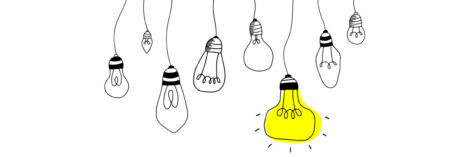Green Family produces and markets traditionally brewed, local and sustainable beers. They are elaborated using a portion of unsold bread in the recipes. The Cocomiette beers launched by Charlotte Desombre and Amandine Delafon in August 2018 are brewed in two regions in France (Auvergne-Rhône-Alpes and Ile-de-France).
Discover this entrepreneurial adventure in this new podcast.
Summary
- Chapter 1: Your entrepreneurial experience in 3² points
- Chapter 2: The genesis of the business idea
- Chapter 3: Confirmation of the business idea
- Chapter 4: Getting started
- Chapter 5: Take-off
- Chapter 6: The future
- IntoTheMinds podcasts
The marketing idea to be retained absolutely
Before starting, it is imperative to validate your ideas through comprehensive market research. Green Family has gone through these steps to confirm its theory: research of the traditionally brewed beer market, a study of bread wastage, research into the marketing mix, quantitative research and a test phase for the first product.
Chapter 1: Your entrepreneurial experience in 3² points
3 key figures
2.5 tonnes of recycled bread, 100,000 bottles of beer brewed, 4 recipes for traditional and sustainable beers.
3 Tips for future start-uppers
Tip 1: To be well supported (advisers, coaches)
Tip 2 : Test your idea
Tip 3 : Regular exercise to go the distance
3 essential skills to launch a start-up
The first skill evoked by Charlotte Desombre is autonomy. The second essential skill for an entrepreneur is adaptability. Finally, the third skill is linked to a sense of responsibility.
Entrepreneurship is a risk that must be taken to run a company successfully and make it profitable.
Chapter 2: The genesis of the business idea
Green Family is a company that produces and markets traditionally brewed, local and sustainable beers. The Cocomiette beers include a portion of unsold bread in their recipe. They are brewed in two regions of France: Auvergne-Rhône-Alpes and Île-de-France. The company’s objective is to enhance the value of their local roots, whether it be for collecting the bread, brewing the beers, or selling them.
The bread saved from wastage replaces between 30 and 35% of malted cereals depending on the recipe.
The objectives and values of Green Family and Cocomiette beers
- Limiting the carbon impact of transport
- Participating in regional economic development
- Favouring local suppliers and service providers
The idea behind Green Family comes from a revolt against food waste, led by the two co-founders (Charlotte Desombre and Amandine Delafon). Their attention then turned to bread. A cherished food of the French, it is primarily wasted by its nature, its price, and its abundance in the French diet. Bread is said to account for 15% of the food wasted in France.
The aim of Cocomiette was, therefore, to create a project that would enable bread to be recycled and valorised. It was a Belgian project that inspired them: The Brussels Beer Project – launched by Olivier de Brauwere and Sébastien Morvan, the Brussels Beer Project innovated with home-made beers. Babylon was one of them, brewed using bread collected in supermarkets.
Chapter 3: Confirmation of the business idea
The confirmation of the entrepreneurial idea was done by applying different market research techniques: analysis of market growth, local research, research on the demand.
We had one worrying question: what would consumers think of a beer made with recycled bread?
The analyses carried out as part of the market research:
- Analysis of the traditionally brewed beer market (that continues to grow, as we analysed in a previous post)
- Local research on bread wastage (from bakeries)
- Study of the Marketing Mix to confirm the brand name, the concept, the price and the slogan.
- Quantitative research with a sample of 125 people
- Testing of the first product, redhead with bread, with different types of people (friends, potential customers, grocery shops, cheese shops and fellow brewers).
Chapter 4: Getting started
Initially, clients were found through the network of the 2 co-founders. This is a widespread case among entrepreneurs. Thus, it was possible to “recruit” restaurant friends on the one hand, and local grocery shops in the Grenoble and Paris regions where Charlotte and Amandine live on the other.
Charlotte explains how the company operates and underlines the importance of the network:
- Charlotte explains how the company operates and underlines the importance of the network:
- This bread allows Cocomiette beers to be brewed in a traditional external brewery near Grenoble.
- The ring is duplicated in Île-de-France for local attachment.
- The collaboration with Nathalie Munch (master brewer) who developed all the recipes for Cocomiette beers and was a crucial advisor in the development of the bread brewing process.
Charlotte Desombre then went door-to-door to restaurants, grocery shops, cheese shops and wine shops to test the product and the concept and, finally, to confirm the target of potential customers.
When you’ve spent a day going door-to-door and haven’t had a single customer sign up, you have to know how to bounce back the next day.
Entrepreneurs often mention this capacity for resilience at our microphone. If you want to get started, be prepared for failure and don’t get discouraged. Success does not always come quickly.
The positive market signs
- Customers who quickly became regular customers
- Silver medal at the national beer competition (la Rousse au pain)
- The arrival of new market participants
Chapter 5: Take off
While 2020 was planned as the significant year of Cocomiette’s take-off, two years after the creation of the Green Family company, Charlotte Desombre and Amandine Delafon have to review their scenarios because of the COVID crisis. However, their objective remains to:
- Strengthen the brand’s presence in the cities where it is present (Paris, Lyon, Grenoble)
- Enlarge the catchment area in neighbouring departments (Auvergne, Rhône-Alpes, Savoie, Haute-Savoie, Île-de-France)
To continue their momentum, a fundraising campaign was planned and will be postponed given the economic situation in 2020. Also, the co-founders of Green Family have launched a procedure for the labelling of “organic products”.
The idea is that all our beers should be labelled organic, which will open the doors to specialist retailers and allow us to increase our volumes.
Chapter 6: The future
The main business objectives of Green Family are the development of the brand in new geographical areas as well as the “organic” labelling of the beers. It should be noted that the sale of organic products is 20 to 30 points higher than that of conventional products since the Covid-19 crisis (see our article on the impact of the COVID on food retail here).
Also, the company wants to invest in premises to internalise bread processing and thus be able to collect unsold goods from new partners. The idea is also emerging in having a production tool that would allow new recipes to be tested.
On the staffing level, Charlotte Desombre and Amandine Delafon would like to recruit a sales representative. Within a few years, they hope to move to a team of around ten people, with profiles that have remained distant from the employment market.
For us, it is imperative to make a genuine company profitable, but also to be able to recruit and participate in the integration of people who are out of work.
A podcast to help you develop your start-up
In 2020 we are changing the format of our podcasts. The aim is to help you develop your start-up by providing you with relevant information on specific topics.
Our podcasts are now divided into chapters of +/- 3 minutes. Each chapter is dedicated to a specific theme or development phase. You can therefore listen to the entire podcast or choose to listen to only part of it by directly selecting the part that interests you the most.
Illustration : shutterstock
Posted in Non categorizzato.






